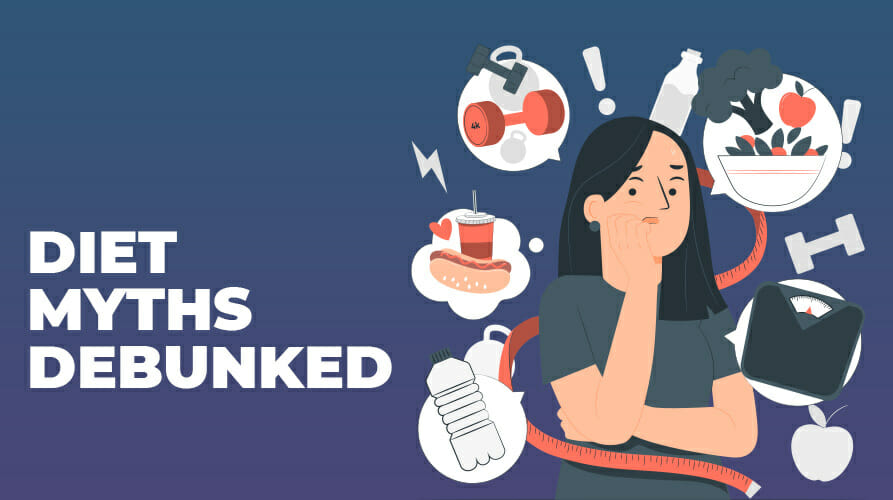Let’s debunk a few popular diet myths so that you can make wise decisions. There are a number of articles and videos giving nutritional tips. Many claim something, while others say something else. All this creates confusion about what to eat and what not to eat.
Here are 6 of the biggest diet myths that need clarification.
Diet Myths:
Myth #1: Fats are bad for you
It’s a slightly incorrect theory that all fats are bad for your health. Our body depends on fats for energy production, vitamin absorption, and other important functions. Higher fats put you at a greater risk of various problems like a weak metabolic systems, heart conditions, and more. However, foods with low fat, mainly monounsaturated and polyunsaturated fats, can be consumed in moderation to carry out healthy bodily functions. The list includes flaxseeds, fatty fish, olive oil, avocados, peanuts, and more.
Myth #2: Cut back on salt entirely
While reducing salt intake can reduce your blood pressure levels, cutting it completely can have major consequences. As per an American dietary standard, one should take no more than 2,300 mg of sodium (salt) per day. It is a safe number. However, junk and processed foods account for a gigantic portion of salt. You should cut back on these foods.
Consuming salt in the right way has various health benefits. It is a wonderful source of electrolytes. Without electrolytes, your body will experience fatigue, muscle cramps, and nausea. Sodium also supports a healthy nervous and heart system.
Myth #3: Skinny means healthy
One of the most common diet myths is that you need to be skinny to be healthy. Body weight is in fact an unimportant indicator. When it comes to health, it is more about what you eat. It’s better to be chubby and physically active than thin and bodily weak. Still, reducing weight can protect you from diseases. But the larger goal should be eating a nutritious, wholesome diet and working out to improve your strength.
Myth #4: Gluten-free food is healthier
Gluten-free is the new trend. You will see a lot of restaurants and DIY recipes focusing on this buzzy trend. The diet is devoid of gluten, a protein found in wheat and other grains. Those with celiac disease or gluten insensitivity adopt this diet. Those following it may lose weight as a lot of processed food contains gluten. And cutting on them reduces gluten levels as well as weight. But gluten free food is not rich in essential vitamins.
Some food may contain high amounts of sodium, fats, and sugar. Eating these foods can increase blood sugar levels and blood pressure. To balance it, make sure to include fruits and vegetables in your daily routine.
Myth #5: Calories in, calories out
“Calories in, calories out” is a popular method to maintain weight. In this, you need to lower your daily calorie count. Experts say that this diet myths is the most misguided one. The reality is that even mindful calorie calculations don’t always produce uniform results. As our body burns calories differently, depending upon the body’s metabolism.
Instead, focus on a quality diet. Avoid processed and junk food. Exercise regularly and sleep soundly. Poor quality sleep also affects health.
Myth #6: Supplements are useless
It is recommended to take maximum nutrients from the diet. However, it can be difficult to get all the necessary vitamins and minerals for good health. It is true that supplements cannot take the place of natural food but they can offer enough amounts of crucial nutrients.
Dietary supplements when taken in the right quantity and right form complement our body’s health. Make sure that it does not contain artificial preservatives and chemicals.
Now that all the diet myths are busted, you can live a mindful, healthy life.
